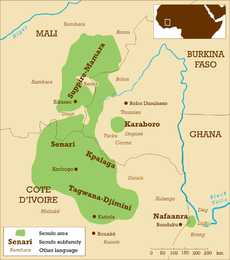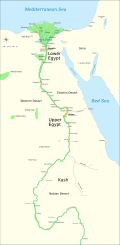Portal:Africa



Africa is the world's second-largest and second-most populous continent after Asia. At about 30.3 million km2 (11.7 million square miles) including adjacent islands, it covers 20% of Earth's land area and 6% of its total surface area. With nearly 1.4 billion people as of 2021, it accounts for about 18% of the world's human population. Africa's population is the youngest among all the continents; the median age in 2012 was 19.7, when the worldwide median age was 30.4. Based on 2024 projections, Africa's population will reach 3.8 billion people by 2099. Africa is the least wealthy inhabited continent per capita and second-least wealthy by total wealth, ahead of Oceania. Scholars have attributed this to different factors including geography, climate, corruption, colonialism, the Cold War, and neocolonialism. Despite this low concentration of wealth, recent economic expansion and a large and young population make Africa an important economic market in the broader global context. Africa has a large quantity of natural resources and food resources, including diamonds, sugar, salt, gold, iron, cobalt, uranium, copper, bauxite, silver, petroleum, natural gas, cocoa beans, and.
Africa straddles the equator and the prime meridian. It is the only continent to stretch from the northern temperate to the southern temperate zones. The majority of the continent and its countries are in the Northern Hemisphere, with a substantial portion and a number of countries in the Southern Hemisphere. Most of the continent lies in the tropics, except for a large part of Western Sahara, Algeria, Libya and Egypt, the northern tip of Mauritania, and the entire territories of Morocco and Tunisia, which in turn are located above the tropic of Cancer, in the northern temperate zone. In the other extreme of the continent, southern Namibia, southern Botswana, great parts of South Africa, the entire territories of Lesotho and Eswatini and the southern tips of Mozambique and Madagascar are located below the tropic of Capricorn, in the southern temperate zone.
Africa is highly biodiverse; it is the continent with the largest number of megafauna species, as it was least affected by the extinction of the Pleistocene megafauna. However, Africa also is heavily affected by a wide range of environmental issues, including desertification, deforestation, water scarcity, and pollution. These entrenched environmental concerns are expected to worsen as climate change impacts Africa. The UN Intergovernmental Panel on Climate Change has identified Africa as the continent most vulnerable to climate change.
The history of Africa is long, complex, and varied, and has often been under-appreciated by the global historical community. In African societies the oral word is revered, and they have generally recorded their history via oral tradition, which has led anthropologists to term them oral civilisations, contrasted with literate civilisations which pride the written word. During the colonial period, oral sources were deprecated by European historians, which gave them the impression Africa had no recorded history. African historiography became organized at the academic level in the mid-20th century, and saw a movement towards utilising oral sources in a multidisciplinary approach, culminating in the General History of Africa, edited by specialists from across the continent. (Full article...)
Selected article –
A civil war between two major rival factions of the military government of Sudan, the Sudanese Armed Forces (SAF) under Abdel Fattah al-Burhan and the paramilitary Rapid Support Forces (RSF) and its allies (collectively the Janjaweed coalition) under the Janjaweed leader Hemedti, began during Ramadan on 15 April 2023. Three minor (neutral) factions have also participated in the fighting: the Darfur Joint Protection Force; the SLM (al-Nur) under Abdul Wahid al-Nur; and the SPLM-N under Abdelaziz al-Hilu. Fighting has been concentrated around the capital city of Khartoum (the largest and initial battle of the war) and the Darfur region. As of 14 November 2024, at least 61,000 people had been killed in Khartoum State alone, of which 26,000 were a direct result of the violence. As of 5 July 2024, over 7.7 million were internally displaced and more than 2.1 million others had fled the country as refugees, and many civilians in Darfur have been reported dead as part of the Masalit massacres.
The war began with attacks by the RSF on government sites as airstrikes, artillery, and gunfire were reported across Sudan. The cities of Khartoum and Omdurman were divided between the two warring factions, with al-Burhan relocating his government to Port Sudan as RSF forces captured most of Khartoum's government buildings. Attempts by international powers to negotiate a ceasefire culminated in the Treaty of Jeddah in May 2023, which failed to stop the fighting and was ultimately abandoned. (Full article...)
Featured pictures –
Did you know (auto-generated) -

- ... that enrollment at a school for African-American students in Virginia grew from 14 pupils to 1,300 in its first ten years?
- ... that the Indianapolis African-American community raised $100,000 in just ten days in 1911 to establish the Senate Avenue YMCA?
- ... that actress Dorothy Van Engle starred in the 1935 movie Murder in Harlem with a "proto-feminist role" that was then a primary source of positive representation for African Americans in film?
- ... that Freetown, Alabama, was founded by free and formerly enslaved African Americans in Alabama, whose church, built in 1929, burned down in 2022?
- ... that the Phoenixonian Institute was the first African-American high school in California?
- ... that the growth of Christianity in 20th-century Africa has been termed the "fourth great age of Christian expansion"?
Categories
Selected biography –
Hamidou Maiga (born 1932) is a Malian studio photographer among the region's pioneers in the craft during the postcolonial period. His work was largely unknown in the West prior to his discovery and display in the early 2010s. Maiga's early outdoor portraits from the Niger River region in the late 1950s reflect Mali's period of societal transition from colony to sovereignty. He has exhibited in solo shows in London and Lima, Peru. (Full article...)
Selected country –
 |
 |
||

| |||
Guinea, officially the Republic of Guinea (French: République de Guinée), is a nation in West Africa, formerly known as French Guinea. It borders Guinea-Bissau and Senegal to the north, Mali to the north and north-east, Côte d'Ivoire to the south-east, Liberia to the south, and Sierra Leone to the south-west. It encompasses the water source of the Niger, Senegal, and Gambia rivers. The name Guinea is used for the region of most of Africa's west coast south of the Sahara desert and north of the Gulf of Guinea. Guinea is sometimes called Guinea-Conakry per its capital, to differentiate it from the neighboring Guinea-Bissau (whose capital is Bissau).
Richly endowed with minerals, Guinea possesses over 25 billion metric tons of bauxite–perhaps up to one half of the world's reserves. In addition, Guinea's mineral wealth includes more than 4 billion tons of high-grade iron ore, significant diamond and gold deposits, and undetermined quantities of uranium. Soil, water, and climatic conditions provide opportunities for large-scale irrigated farming and agro industry. (Read more...)
Selected city –
Ibadan (UK: /ɪˈbædən/, US: /ɪˈbɑːdən/; Yoruba: Ìbàdàn) is the capital and most populous city of Oyo State, in Nigeria. It is the third-largest city by population in Nigeria after Lagos and Kano, with a total population of 3,649,000 as of 2021, and nearly 4 million within its metropolitan area. It is one of the country's largest cities by geographical area. At the time of Nigeria's independence in 1960, Ibadan was the largest and most populous city in the country, and the second-most populous in Africa behind Cairo. Ibadan is ranked one of the fastest-growing cities in sub-Saharan Africa, according to the UN Human Settlements Program (2022). It is also ranked third in West Africa in the tech startups index. Ibadan joined the UNESCO Global Network of Learning Cities in 2016.
Ibadan is located in south-western Nigeria, 129 kilometres (80 mi) inland northeast of Lagos and 530 kilometres (330 mi) southwest of Abuja, the federal capital. It is a prominent transit point between the coastal region and areas in the hinterland of the country. Ibadan had been the administrative center of the old Western Region since the early days of British colonial rule, and parts of the city's ancient protective walls still stand to this day. The principal inhabitants of the city are the Yoruba people, as well as various communities (notably Igbo, Hausa, Edo, and Ibibio) from other parts of the country. (Full article...)
In the news
- 18 January 2025 – 2025 Suleja fuel tanker explosion
- At least 77 people are killed and several others are injured when a fuel tanker overturns on a highway in Suleja, Niger State, Nigeria, and later explodes when people gather to collect the spilled fuel. (Vanguard) (The Straits Times)
- 17 January 2025 –
- Three people are killed and seven others are injured in clashes with security forces in Juba and Aweil, South Sudan, with three Sudanese-owned houses set on fire in Aweil. This comes after videos emerged allegedly showing Sudanese soldiers killing South Sudanese civilians in Wad Madani, Sudan. (BBC News)
- 16 January 2025 – Somali Civil War, War against the Islamic State
- The Puntland Security Force claims to have captured a training facility used by ISIL militants, with over forty ISIL fighters killed following heavy fighting. (The Eastleigh Voice)
- Thousands of families are displaced as the military campaign intensifies, forcing locals to flee their homes in Bari region of Puntland, Somalia. (Idil News) (Horn Observer)
- 16 January 2025 – Red Sea crisis
- The leader of the Houthis Abdul-Malik al-Houthi announces that the group will monitor the implementation of the Israel–Hamas ceasefire agreement and continue its attacks on vessels and on Israel if the ceasefire is breached. (Middle East Monitor)
- 16 January 2025 – Sudanese civil war
- The U.S. Treasury Department sanctions the head of the Sudanese Armed Forces Abdel Fattah al-Burhan for "destabilizing Sudan and undermining the goal of a democratic transition" to a civilian-led government. (BBC News)
Updated: 15:05, 19 January 2025
General images -
Africa topics
More did you know –
- ...that Iyabo Obasanjo-Bello, a Nigerian Senator from the People's Democratic Party, is the daughter of former President Olusegun Obasanjo?
- ...that the 2007 South Africa miners' strike, which impacted over 240,000 workers, was the first ever industry-wide miners' strike in the history of South Africa?
- ...that Seleh Leha, a town in Tigray Region in northern Ethiopia, was the site of a leprosarium built during the Italian occupation of East Africa and abandoned in 1941?
- ...that Sarir field, an oil field in Cyrenaica operated by the Arabian Gulf Oil Company (AGOCO), is considered to be the largest in Libya, with estimated oil reserves of 12 Gbbl (1.9×109 m3)?
Related portals
Major Religions in Africa
North Africa
West Africa
Central Africa
East Africa
Southern Africa
Associated Wikimedia
The following Wikimedia Foundation sister projects provide more on this subject:
-
Commons
Free media repository -
Wikibooks
Free textbooks and manuals -
Wikidata
Free knowledge base -
Wikinews
Free-content news -
Wikiquote
Collection of quotations -
Wikisource
Free-content library -
Wikispecies
Directory of species -
Wikiversity
Free learning tools -
Wikivoyage
Free travel guide -
Wiktionary
Dictionary and thesaurus
























































































